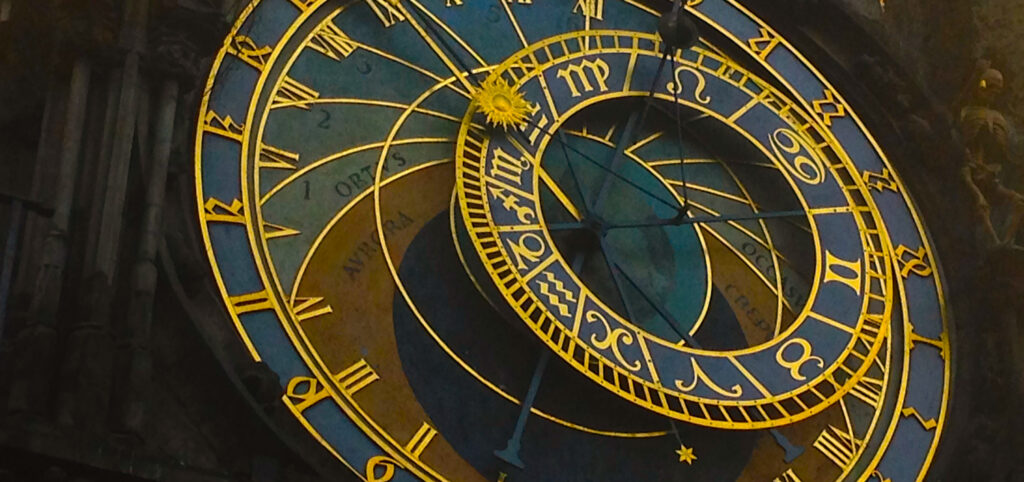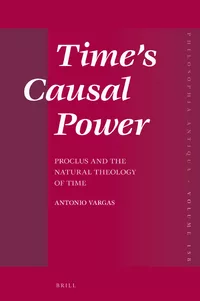
“A season is set for everything, a time for every experience under heaven” – Kohelet 3:1
What time is it? 13h00? One o’clock? Lunch time? The time I almost choked on rice? 5783 years since the creation of the world? The question of what time is it admits of many answers because time has many aspects: it refers to our day to day activities, but its also an objective measurement; it is the context for both social activity and the arena where divine providence plays out. An adequate theory of time seeks to unite all these different aspects in a single account. A Platonist theory of time seeks to show that all the diverse aspects of time are grounded in the divine.
Interested students and lovers of philosophy are invited to the course “Time and the Gods”, which will be an introduction to the theory of time of the Platonist Proclus, the most systematic Platonist of antiquity. It will take place over seven classes in seven weeks in November-December. The classes will be synchronous classes over zoom and will be recorded and made available for the students who wish to go over the material or who were not able to attend.
IMPORTANT: The exact time of the weekly classes has not yet been established, and interested students are encouraged to express their interest in the course as soon as possible so that the best time for all possible students can be found.
Students will have access not only to recordings of the classes, but also to additional texts for those who wish to read further on their own. These will all be made available in a google drive. Furthermore, for the duration of the course, both in and outside of class, I will be available to answer any questions or comments and also to give feedback on short texts written by students on the subject.
The course will cost R$ 500,00, which will be payable via bank transfer or PayPal. For those paying in dollars and through PayPal this should come to a little over US$ 100,00, given the current exchange rate and the need to cover the PayPal transfer fee.

This course overlaps in part with my book “Time’s Causal Power: Proclus and the Natural Theology of Time” (Brill, 2021), but it goes much beyond it. In particular, whereas my book is primarily a book on the history of philosophy and the reconstruction of Proclus’ philosophy of time on the basis of his reception of past philosophers, the course will have a more speculative nature, going into Platonist material that did not make it into the book and also entering into dialogue with contemporary philosophies, particularly the Kantian and Phenomenological traditions.
Here is a short description of each class:
Day One: Introduction to Platonist Cosmology
The study of ancient cosmology can seem pointless: don’t we know much more about the physical world now? Were Greek philosophers not wrong about many things, most famously about the place of the earth in the cosmos? “We, Copernicans” have outgrown the closed world of Plato and Aristotle. And yet, modern science raised and still raises enormous problems for its justification as knowledge. To face these challenges, the German philosopher Immanuel Kant proposed a Copernican revolution of his own, by which he sought to ground knowledge on the human perspective. It is precisely this Kantian revolution, together with its developments in phenomenology, which allows us to understand what Proclus and the Platonists meant by “the world” and why what they have to say about the world can still teach us today.
Second Day: Introduction to Platonist Theology
The search for an indubitable starting point has been a concern of philosophers since Plato, and especially when seeking knowledge about the changing and complex perceptible world. René Descartes, at the start of modern philosophy, sought that certainty in the I: “I think, therefore I am”. In this class, before we go into the details of the Procline theory of time, we will look into his own indubtable starting point: Unity itself, tó hén. I will develope an argument based on Proclus’ texts, but drawing on many other philosophers from Plato to Kant and Fichte and contemporary Brazilian philosophers Vicente Ferreira da Silva and Eudoro de Sousa, for the existence of Unity itself as the ground of all reality. Starting from ourselves and our capacity to say “I” we will conclude that all of existence is grounded in the divine.
Third Day: The Cosmic Gods
Having established in the second class that existence is grounded in the divine, in the third class we will discuss the divine causes that are immediately responsible for the world and its order. These include Time itself, the Heavens and the Heavenly bodies, and the Earth. We will discuss how can we know that these gods exist and are in fact gods and how they relate to the divine and primary Unity.
Fourth Day: The Flow of Time and the Existence of Final Causes
If Time is a god, as explained in the third class, it itself is not a thing, but things are in time. We will study an argument that starts out ffrom the division of time into past, present and future and that concludes that there must exist final, formal and efficient causes for temporal things. We will see that it is because things have a past that they must have a purpose and it is because things are present that there must be some pattern to their development. This will introduce a key notion from Proclus, the idea that each thing in the world has its own particular temporal form.
Fifth Day: The Unity of Time and the Sympathy of the Cosmos
If each thing lives according to its own temporal form, how can there be a single time in the whole world? In this class we will study an argument that sets out from the phenomenon of simultaneity to conclude that the whole world is animated by a single soul. This Soul of Nature is the ground for the existence of sympathetic relations between heavenly and terrestrial phenomena, and also for the fact that there is a single common time with a distinct quality or nature at each moment.
Sixth Day: The Measurability of Time and the Distinction Between Heaven and Earth
If there is a common time for the whole world then there is a common flow of time for all things. And between this common, absolutely uniform flow and the complex changes that we see in the world, the regular motions of the heavens mediate. Here we return to the issue of the cosmic gods and their role.
Seventh Day: Human Action in Meaningful Time
If there is a final cause for all things, then each human life must have such a final cause. If there is a universal sympathy in the cosmos, then we are also included in that sympathy. If the stars measure the changes on earth, then they measure also our own lives. In this last class we will see the ethical consequences of the theoretical arguments developed during the course.